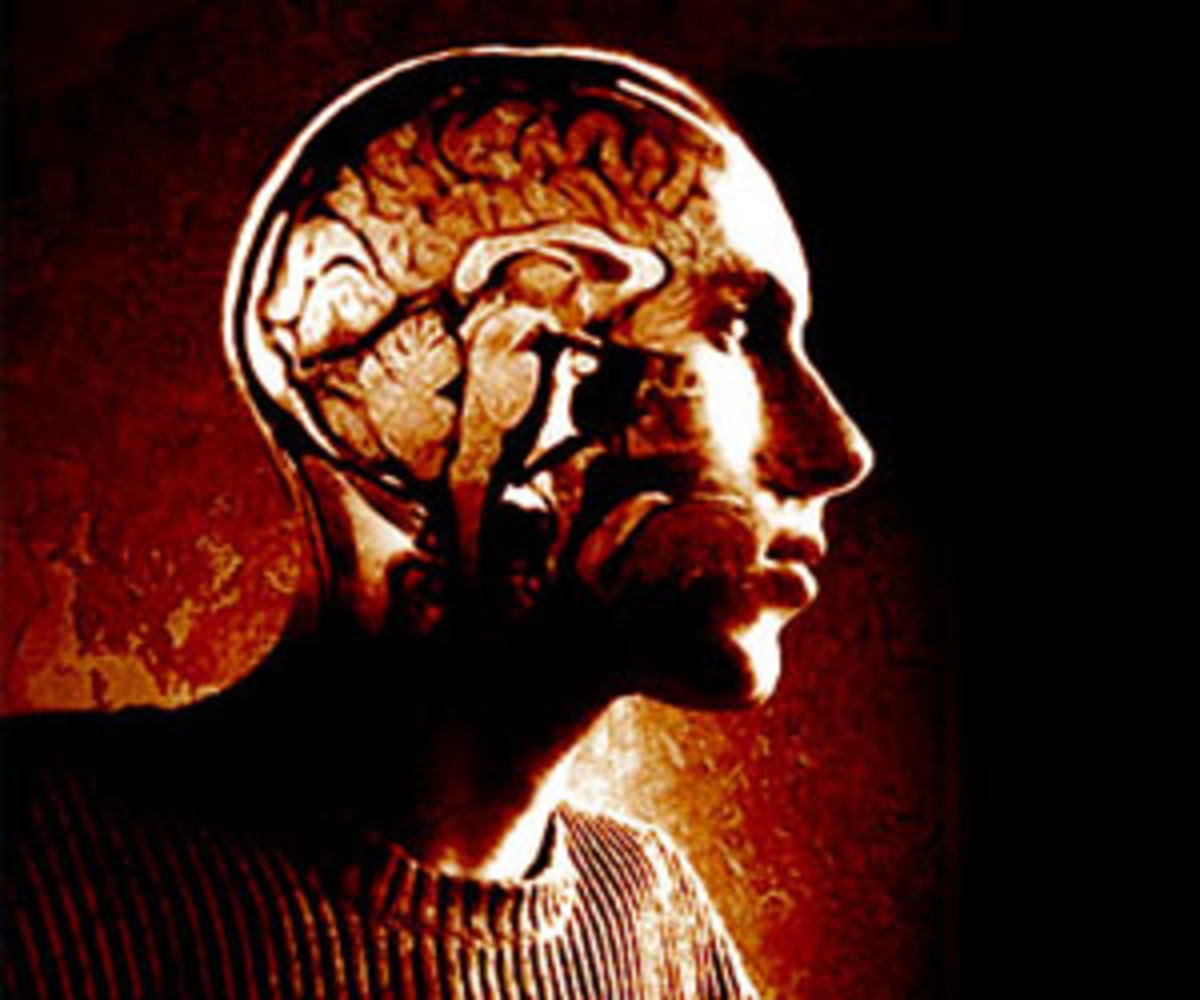Religion And Schizophrenia
Schizophrenia can be triggered by a variety of environmental factors, including significant stress, intensely emotional situations, and disturbing or uncomfortable experiences. It is possible that religion itself may be a trigger for schizophrenia. Religious imagery is often very grandiose, and defies commonly held beliefs of what is realistic and natural in the world.
Experiencing an intense religious experience may trigger a psychotic episode in those who are vulnerable to them, because religion OFTEN requires a believer to suspend their usual idea of what is possible and impossible. This could potentially lead to a psychotic episode due to the shift in realistic thinking. For example, a sufferer may believe that God himself is speaking to him. It has been shown that those with schizophrenia who suffer from religious delusions are more religious than those who do not suffer from these delusions.
With some of the more rabid believers, it is hard to differentiate between a religious belief and a Mental Health issue.I think you may be putting the cart in front of the horse.
Schizophrenia either exists or it doesn't. Schizophrenic delusions run the gambit of subjects.
I'm absolutely sure that "those with schizophrenia who suffer from religious delusions are more religious than those who do not suffer from these delusions".
I think that's pretty self-explanatory. It doesn't mean they're more likely to suffer delusions in general, just that their delusions are more likely to be religion based. Does it really matter what the delusions are about? I mean is it any worse that they think God is talking to them than if they thought Buddy Holly was?Maybe it does matter if the delusions are religious based. Many people in these forums state they will follow the word of God without question. Starting with that premise is seems reasonable that if one thinks God is asking for specific things one might me more likely to do them than if one thinks his imaginary friend is asking them.
The case in the link in one that I've mentioned several times because it struck me as something very disturbing. When the man was eventually put on meds he stated he understands that God would never ask him to do anything like that, but the OT states many times that God asked people to do much worse.
http://en.wikipedia.org/wiki/Killing_of_Tim_McLeanHe was going to hear voices anyway. Religion didn't cause the delusions, schizophrenia did. What he called the voices means very little. They were still going to be there. Would it have been better if he named them "Siegfried and Roy" and killed and ate someone because "Siegfried and Roy" told him to?
Schizophrenics follow the voices and delusion because they don't know they are voices and delusions. It's not "Oh, I believe in God and this is God talking, so I'll listen to him" It's their reality. They have no choice but to follow it, whether they attribute it to God or not.
The voices are most often attributed to aliens, the government, a dead loved one, God, devil... whatever. They will attribute it to whatever seems to make most sense. Atheism wouldn't stop that, it would just change the name of the "entity" giving commands.I'm forced to agree. I've given it some thought and think your right.
Actually, I think we were both right. Getitrite was too, sort of.
http://arno.uvt.nl/show.cgi?fid=114836
Caveat: This paper talks about the psychopathological form of extreme religiosity. This does not in any way shape or form indicate that every person who is religious mentally unstable. These are the people who see/hear God or believe that they are God.I've found or think or am inspired by Getirite, as he seems to have it right in my eyes at least most of the time. At the very least he has it right in my eyes.
Eh, I probably still have a bias. He spent a thread accusing me of being delusional with absolutely no idea of what my actual religious views were, just that I had Christian views. It was very off-putting.
If he were a little less err...enthusiastic about his expression of views on religion, he'd likely have more productive conversations.
Melissa,
I remember only having a few brief exchanges with you on the forums. I know you are a believer, but not like the bible thumpers. I am a former believer myself. Of course, we are going to disagree, but I don't remember just what the disagreement was about. Sorry that you felt "put off"It wasn't too long after I started...maybe a year and a half ago.
So'kay. I'm not all that memorable.
I'm not all that memorable.I am, now, trying to reserve my vitriol for the trolls, and those who throw ad hominems at me.
Ad hominiems are heavy. How about I just toss a bit of sophistry around and call it a day?
And, unlike other triggers, religion is sanctioned by what's considered a reasonable society. Religions routinely say things that are completely illogical, so we can't tell the difference between devoutly religious or a serious mental issue.
Abraham was told to slaughter his own son.I completely agree with you my friend. It is true. As a nurse ,as a theology and theosophy teacher, as the wife of a schizophrenic and a believer, you are right. There are thousands of examples in holy books ( Christian and others) that are textbook examples of delirious behavior. Up until the 19 century it was almost unheard off to consider mental illness in a religious community.Hence exorcisms, sacrifices and other absurd practices.
But in the same token, many bible stories are meant to be metaphors, parables to teach a moral lesson. Now, if people choose them as markers to explain or use as a precedent in a religious setting that is when lives are destroyed. Example, holy wars. It can be very difficult to separate their reality from a what many call a religious experience.
I was just making an observation pertaining to several of the believers that I discuss things with, here. They get extremely angered, and just spout empty threats...and instead of discussions, their responses turn into mindless drivel, making any sensible argument meaningless. You have had exchanges with some of these people yourself. Yes, it is the disorder driving the behavior, and the religion is just one of the symptoms.
IMO It appears that there is more going on with them than just the religious belief.
The only difference is that people like Jim Jones and David Koresh probably couldn't easily get congregations of people to follow them if they told people that Buddy Holly was talking to them.Eh, I don't think ass-hattedness is a clinical diagnosis.
You'll find that mentality/behavior in almost any situation where there are two sides. You just choose to examine the religious zealots. There are zealots about almost everything you could think of in almost all walks of life.
I suppose in some cases it could be some underlying psychological/neurological condition. I can think of ten or so off-hand. Narcissim, Borderline personality disorder, I've even seen a few potential aspies floating around these boards.
But, in general, I would say it's just people wanting to argue. Go spend some time on a Justin Bieber chatroom. Say that Selena is/would be better off without him. You'll see the same behavior. I daresay I've met a few atheists showing the same tendencies.
I'll give you some ground on the Religious cults thing. Of course by common definition, a cult is religious based. Preppers exhibit the same behaviors. Radical political groups do too. We just don't call them cults. We call them "Extremists" or some such. Any group acting outside of social norms has some of/most of the characteristics of a religious cult... just without the religion.I've known sports fans who "get extremely angered, and just spout empty threats...and instead of discussions, their responses turn into mindless drivel, making any sensible argument meaningless", even to the point of committing violence. This type of behavior is quite typical for human beings but usually suppressed through the layers of socialization we call civilization (particularly in western societies). The nature of the internet seems to bring it out more in people. I think it's likely to be related to tribalism rather than mental ill health.
Let me put it another way, by changing a few words in your post we could attribute the onslaught of schizophrenia to many triggers
Schizophrenia can be triggered by a variety of environmental factors, including significant stress, intensely emotional situations, and disturbing or uncomfortable experiences. It is possible that marijuana itself may be a trigger for schizophrenia. Drugs imagery is often very grandiose, and defies commonly held beliefs of what is realistic and natural in the world.
Experiencing an intense skunk experience may trigger a psychotic episode in those who are vulnerable to them, because drugs OFTEN requires a user to suspend their usual idea of what is possible and impossible. This could potentially lead to a psychotic episode due to the shift in realistic thinking. For example, a sufferer may believe that God himself is speaking to him. It has been shown that those with schizophrenia who suffer from drug induced delusions are more susceptible than those who do not suffer from these delusions.
With some of the more rabid users, it is hard to differentiate between a high and a Mental Health issue.No offense, but I fail to see why you see this as any useful information. If I choose to SPECIFICALLY write about RELIGION and Schizophrenia, why would I be interested in discussing those other triggers?
Because as you said yourself Schizophrenia has many triggers, then you concentrate on one in particular that may or may not trigger it.
Do you think giving up or banning religion will stop schizophrenia?
I know many religious people non as far as I know have schizophrenia, however In my employment I have come across many drug users who are schizophrenic, so from a personal point of view I think it is more likely that drug users are inflicted with this terrible mental illness than those who follow a religion.
The royal college of psychiatrists say ". People with schizophrenia are more likely to be victims of violence by others."
So my question to you is why chose religionists as the starting point for your topic on schizophrenia?Yes, because that's the particular trigger that I want to focus on. If I need to clarify this any further, I feel there is a serious disconnect or a severe comprehension problem.
Why are you jumping to that conclusion? It seems that you might be a little too emotionally attached to religion. Or are you dealing with Schizophrenia? I have not...or even implied the banning of religion.
Then you should start a forum about that if you want to discuss it. However, this forum is about RELIGION AND SCHIZOPRENIA. You seem to have no real line of reasoning here.
What difference does it make? Again, your line of reasoning seems completely illogical. You don't get to tell me what MY topic is. The topic is "RELIGION AND SCHIZOPHRENIA".....If I wanted to discuss the color "orange" why should I need to change it to "green" because you don't like discussing the color "orange" ???It's simple, you have chosen to associate religion with schizophrenia obviously to attack religion, does religion scare you that much?
Non of the medical evidence points directly to religion causing mental illness, your own slant and bias leads you to believe that someone who follows a religion is mentally unstable. The evidence supports that some people are born with the triggers in place or have brain damage. This suggest that anyone can be schizophrenic, it can be brought on by stress, trauma or some types of drugs.
So in conclusion the statement you have made about schizophrenia and religion makes no sense at all.That's not what current research shows.
http://en.wikipedia.org/wiki/Religion_and_schizophrenia
"The relationship between religion and schizophrenia is of particular interest to psychologists because of the similarities between religious experiences and psychotic episodes; religious experiences often involve auditory and/or visual hallucinations, and those with schizophrenia commonly report similar hallucinations, along with a variety of delusions and faulty beliefs. A common report from those with schizophrenia is some type of a religious delusion - that is, they believe they are divine beings, God is talking to them, they are possessed by demons, etc. In a study of patients with schizophrenia that had been previously admitted to a hospital, 24% had had religious delusions. This has led some researchers to question whether schizophrenia leads an individual to become more religious, or if intense religiosity leads to schizophrenia."
"It is possible that religion itself may be a trigger for schizophrenia; religious imagery is often very grandiose, and defies commonly held beliefs of what is realistic and natural in the world. Experiencing an intense religious experience may trigger a psychotic episode in those who are vulnerable to them, because religion often requires a believer to suspend their usual idea of what is possible and impossible. This could potentially lead to a psychotic episode due to the shift in realistic thinking; a sufferer may believe that they themselves are religious deities or Messiahs, or that God himself is speaking to the individual. It has been shown that those with schizophrenia who suffer from religious delusions are more religious than those who do not suffer from these delusions. It has also been shown that those who suffer from religious delusions are less likely to continue long-term treatment."....and that's probably just an overview. I'm sure there are even more in depth studies. Thanks
The interesting thing that I find about that wikipedia article is that the most inflammatory section isn't sourced.
This section, in entirety, has no source.
"It is possible that religion itself may be a trigger for schizophrenia; religious imagery is often very grandiose, and defies commonly held beliefs of what is realistic and natural in the world. Experiencing an intense religious experience may trigger a psychotic episode in those who are vulnerable to them, because religion often requires a believer to suspend their usual idea of what is possible and impossible. This could potentially lead to a psychotic episode due to the shift in realistic thinking; a sufferer may believe that they themselves are religious deities or Messiahs, or that God himself is speaking to the individual.
Wikipedia itself knows there is a problem because it says, right at the top:
"This article needs additional citations for verification. Please help improve this article by adding citations to reliable sources. Unsourced material may be challenged and removed. (April 2013)"
In addition, the following sentence:
"This has led some researchers to question whether schizophrenia leads an individual to become more religious, or if intense religiosity leads to schizophrenia"
Is cited to this study, which questions nothing of the sort:
http://www.tandfonline.com/doi/abs/10.1 … q9xVvRDsrU
I think this might be an example of why most schools and universities don't accept Wikipedia as a legitimate source.The study in the link does in fact look into the connection between religion and schizophrenia (there is no way I can spell that word) while I'd have to pay for the entire study the description is very clear and it ends with a once sentence description of the conclusion.
"The religiosity of patients with schizophrenia was assessed while symptoms were more evident and again after treatment, to evaluate changes in religiosity... Patient's responses indicated a reduced need for religion when re-assessed once symptom scores were reduced."
Meaning as they recovered so did the need for religiosity.
I'm aware Wikipedia isn't perfect, but it's getting closer everyday.It does look into the link between hyper religiosity and schizophrenia but it looks into the hyper religiosity within an already schizophrenic population... it doesn't question "if intense religiosity leads to schizophrenia" in any way shape or form.
What it questions is what impact religion has on hyper-religiosity within a schizophrenic patient... which is exactly the same question that I think everybody agrees is a foregone conclusion. Those schizophrenics who are religious are more prone to hyper-religiosity. I.E. that their delusions are more apt to be religious based.
The author is saying that since schizophrenia can lead to a person being more religious that it must mean that being more religious can lead to schizophrenia. That's an obvious logical fallacy that I'm surprised no one else has jumped all over.
The two statements are not equal. The study examines the first statement-sort of- but isn't even attempting to address the second.
Now, delusions are self-feeding. If a psychotic is in the midst of a delusion regarding religion, of course their faith is going to be a huge part of their life, it's going to take prescience over everything. That's what hyper-religiosity is. It's really not that surprising that once the schizophrenia is treated, the patient is less involved in religion. I would assume that schizophrenic patients who have delusions around other subjects, say aliens, are less involved in UFO studies after the schizophrenia is treated as well. Patients who have delusions about government mind control are less involved in politics after being treated...etc.The primary contributing factors to Schizophrenia are genetics, early environment, neurobiology, and psychological and social processes. Scientists are more focused on neurobiology, they know the illness can be treated by suppressing dopamine (and sometimes serotonin) receptors in the brain with medication. And while stress, intensely emotional, disturbing or uncomfortable would most certainly contribute to the symptoms openly presenting themselves, the person would need to possess the genetic and psychological profile for those symptoms to occur. It's highly unlikely religious beliefs alone would bring on those symptoms.
Perhaps, a stronger case can be made for early childhood indoctrination as part of the psychological and social process triggers.
Exactly, and by "vulnerable" we are talking about those who automatically fit the genetic profile for Schizophrenia.
The part in bold says it all:
It has been shown that those with schizophrenia who suffer from religious delusions are more religious than those who do not suffer from these delusions.
"Those with schizophrenia" are more religious, they suffer from religious delusions, and those who do not suffer from those delusions are not schizophrenic.
I would agree, but I think that the claim in the OP was not really a logical fallacy is it was mostly just misleading:
"It is possible that religion itself may be a trigger for schizophrenia."
Yes, religion could trigger and be the focus of schizophrenic episodes, but the person would need to possess the genetic profile in order for the episodes to take place.
I really do not think that anyone accepts Wikipedia as a source. One can see the discrepancies and inconsistencies in Wikipedia.

There are many sociological and psychological books pertaining to the correlation between religion and level of mental health. Beside books, there are some articles in that regard. Some studies indicate that there is a strict correlation between religion and varying levels of mental illness while other studies show that religious people are mentally healthier and happier.
Nope, I cant see anywhere there where it says religion causes schizophrenia and the link suggests they have taken their statistics and facts from researchers.
http://www.helpguide.org/mental/schizop … ymptom.htm
The causes are unknown but episodes of schizophrenia appear to be associated with changes in some brain chemicals. Stressful experiences and some recreational drugs can also trigger an episode in vulnerable people.
http://www.mentalhealth.org.uk/help-inf … zophrenia/
And I cant find any mention of religion here also
http://en.wikipedia.org/wiki/Schizophrenia
Getitrite
What is being asserted is you hate religion and will continue to post unsubstantiated claims to prove your point.
I couldn't give a toss about religion but I do like to know the facts and there are certainly no facts in your post, another case of possibly, maybe, could be but no actual facts.
Religion is very dangerous, as it causes people to be more easily controlled...and feel that they know the truth based upon primitive contradictory nonsensical folk lore. You should be afraid.
I sense that you are this someone, and it's making you very angry. There are some experts who do, in fact, consider religious beliefs a form of mental illness.
Sad that believers have to resort to irrelevant tactics like this, in order to assuage the cognitive dissonance caused by having been brain washed into believing that nonsense is perfectly ok.
Dear Silversspeeder,
Please take the chip off of your shoulder, and try to comprehend what is being asserted here. Your emotional attachment , and your need to defend delusional beliefs are clouding your ability to see things clearly. I never said that religion causes mental illness. So, please count to ten then...think and comprehend the premise, before resorting to this absurd straw man nonsense. In other words, stop being such an angry believer, and actually learn the art of argument.Can you please link to one mental health expert who thinks this and has evidence to support their claim? And I don't mean mental health problems that have religious elements in the symptoms (e.g. OCD expressed as sin obsession). I mean religion itself being or causing mental illness. Because I can't think of a single epidemiological study that shows mental illness is more predominant in religious people and a few (sp. relating to depression) that show the opposite. (And in case you assume bias, I am a life long atheist).
To me, populations wide studies are what tells the story--and they do not show a correlation as far as I am aware.
By my understanding the exact cause of schizophrenia isn't known but it is believed to be tied to genetics and environment. So i don't know that it is possible to claim religion is a trigger. Saying it is possibly a trigger seems a bit misleading, unless you also point out that the likelihood of it being a trigger is no higher than the likelihood of some other belief being a trigger. Although i would think a believer who also had schizophrenia would be more open to the idea that a seemingly external voice was coming from an authoritative position.
I do happen to know a person whose son hears voices. They tell him to burn things. He doesn't think it's God but he appears inclined to follow instructions. So maybe voices, in general, are considered authoritative by a schizophrenic.Yes
Sounds like you think I am picking on religion, but I'm not. Any intensely emotional situation can be a trigger, and religion can be intensely emotional, which can trigger a psychotic episode in people who are vulnerable.
Yeah. I agree with that.
I'll have to check and see if there was ever a schizophrenic who heard a subordinate voice.Well, in view of the closing statement in the OP I don't know that it would be honest to argue you weren't specifically targeting the religious through presenting a faulty argument.
As to the authoritative nature of voices i did do a little research and it appears that some who face their disease head on, with help, have found a way to integrate them into their lives in a positive manner without allowing them to dictate actions.
So the question you are posing is that, given the tendency for religions to encourage belief in the "supernatural," that they, in and of themselves, could be a trigger for schitzophrenia? I think that's a bit of a stretch. Someone who is schitzophrenic will believe that whatever they are seeing is real, religious or not. Even if they had had no exposure to religious teachings encouraging belief in the supernatural (sightings, etc.) they would still think that whatever they were seeing, was real. That's also to assume that schitzophrenia is caused by the factors you just described. That's not set in stone.
I think buried in there somewhere was also the question of whether someone who was showing hyper-religious tendencies was more likely to have a mental disorder (schizophrenia)... Which is a slightly different question than if religion was that a cause for schizophrenia. It's also a different question than if those who are religious and schizophrenic are more prone to religious delusions.
So yes, those who are both schizophrenic and religious are more prone to religious delusions.
No, religious belief is not a cause of schizophrenia (or any other mental disorder)
Yes, someone showing extreme hyper-religiosity is likely to have a mental disorder (which may or may not be schizophrenia)Yes I understand what you are saying. I perhaps was not seeing the full question which was being presented. Thanks for the insight.

Any intensely emotional situation can trigger Schizophrenia....and religion can produce intense emotions, but of course, it's all according to the predisposition of the individual.
I think I said that religion MAY BE one of the triggers, not a "cause"
Of course it isn't set in stone, but maybe someday you can conduct your own study.How familiar are you with psychology and the triggers for schizophrenia? I realize that you meant "trigger" and not "cause." I attempted to analyze what you were saying accordingly, but I may have not been very clear. You say that any intensely emotional situation can trigger Schizophrenia....there are a great number of researchers who would disagree with that. That is the point I was questioning. The causes and/or triggers of schizophrenia are still not very clear at this point, but I understand your interest in the possibility of religion being a trigger. Very fascinating subject. I was not attempting to attack you...I was simply questioning the basis of your reasoning. As I do not know much on this subject, I am interested.
Interesting subject.I have been living with a paranoid schizophrenic with religious delirium for 20 years, my husband. Before his first episode at the age of 23, he seldom picked up a bible or went to church.
Unfortunately, when the symptoms started to take form, he was trying to "find meaning" through religion. To the outside world ( even me) he seemed like the perfect Christian. Until he started to fast, pray for hours and listen to uplifting music. As a Christian myself, this was a good thing,until he tried to set himself on fire because he was told "by God", that he was the second coming of Christ. This is my favorite part, to him I was a demon sent to tempt him into sin. The fact that he had some biblical knowledge did not helped at all. Who is going to question or argue that a person might or may not have had "an experience". Believe me is almost impossible, even from a medical/secular point of view. To try to yank out a person in this state to reality is like trying to prove to someone that God does not exist. This disorder is more common that you think. i have met with countless family members of people with this pathology.
The first thing to try to stabilizing him was to remove all and every hint of religious references. Combined with therapy and very potent drugs, is possible to minimize the effect of the voices and undermine the coincidences related to everyday "miracles". So to answer in all honesty, religion has made it very difficult for countless mentally ill patients to find a balance between reality and faith.We have several of those types in our midst here with very much the same symptoms and behavior patterns. Trying to yank them into reality is about the same. They too believe God talks to them.
I think you're being intellectually dishonest. You have to know that speaking metaphorically and saying "God speaks to me" is quite a bit different than saying it literally. I've only seen one poster who said that God LITERALLY spoke to them.
So at most you have a deep-seeded need to be metaphoric... which isn't all that uncommon on a writer's site.
You too, would have more productive conversations if you weren't set on being as offensive as possible.Like I said, I've seen several and they were literal, there's nothing intellectually dishonest about that.
I'm not being metaphoric, sorry to disappoint you.
Pot, meet kettle.I thought we weren't going to be using the pot/kettle/black thing anymore due to overuse.
Also... Im pretty sure it's *deep-seated.You're intentionally trying to be argumentative. I feel like having a conversation, not an argument. Have a nice day.
Your response to me would indicate you wanted a full blown argument, especially after making false statements about me. Pot, meet kettle.
I've seen more than a few say God speaks directly to them, those are the ones that I ask for personal information from.
There's a difference between the concrete and the abstract. Lot's of people say that God speaks to them. Hell, I occasionally say it. The question to ask is "Do you hear a literal voice?" Not a spiritual voice, which is an abstract feeling, but an actual literal voice.
That's the line. When it goes from "I interpret this feeling as God communicating" to "I actually heard his voice, he sounds like Mel Gibson."
I think most of the anti-Christian posters here understand the difference but there are some that pretend that they don't. I get it. That spiritual/mystic crap annoys the hell out of me. It makes the speaker sound batshit. BUT, it's understood that it IS picturesque speech.
Intentional misunderstanding is a dishonest debate tactic.A spiritual voice is an abstract feeling? And, you know this how?
Yes, that's exactly what I was referring to, that there are several people here who say they hear the actual voice of God speaking to them.
Then, you shouldn't use that tactic.
How frightening. It sounds like it was easy for your husband to go undetected for some time, as religious beliefs can provide stellar ways for a real delusion to flourish. I'm sure people suffering from this disorder, can choose other things to obsess over as well. It's unfortunate that they choose religion, because as a former Christian I know that believers think that abandoning your faith is to abandon salvation. But if the sufferer doesn't abandon these beliefs, will it just get worse? Will it be comparable to giving small doses of crack to a crack addiction? I know that his friends and family want him to go to Heaven, hence you don't want him to TOTALLY abandon his faith.
Believe it or not, once He acknowledged that he was sick. It was easier to distinguish one from the other. For him it was a huge relief to finally separate a delusion of grandiose from a belief system. We were both very religious but now we found a balance in spirituality. Is not the same. He never lost faith, but decided that every excess is bad. This is a very complex condition, and to those that are lucky enough, can find a whole new perspective in how human beings process their own sense of belonging. To answer your question, it all depends on how seeded is the delusion, on how strong is the belief system,and how willing is the individual to let treatment take its course. If it were a choice, no one would be sick. No one chooses to be mentally, emotionally and spiritually tortured by the very thing that is supposed to bring hope to their lives. Heaven and hell becomes a secondary or even a non issue. Because believe you me, it is hell to live like that. Does exposing the patient to religious discussions/rituals(church) can become harmful? Maybe, it will never be good for a diabetic to be fed sugary snacks. That is why it is such a cruel disease.
I do understand, somewhat. A close relative of mine suffers from a similar disorder, but has yet to acknowledge that he is sick. He routinely talks to the dead, sees visions, and even gets abducted by UFOs. He seems compelled to share these stories with me and others. I finally told him that he should get professional help. He became extremely angry and hurt, and harbors extreme hatred towards me.
People develop delusions that relate to things they find significant. Just as people with OCD do and a religious person might obsess about being sinful where another will obsess about being clean, I see no connection whatsoever between religious people being more likely to have religious delusions or obsessions (fact) and the idea that religious people are more likely to become schizophrenic (or OCD) (not fact).
Maybe, it will never be good for a diabetic to be fed sugary snacks. That is why it is such a cruel disease.
I did a quick review of research in the last few years and the clinical studies I found suggest religion aids mental health or is neutral. I found none that established atheism as a benficial factor.
e.g.
Aids
Koenig, H. G. (2009). Research on religion, spirituality, and mental health: A review. Canadian Journal of Psychiatry, 54(5), 283-291.
Pirutinsky, Steven, et al. "Does social support mediate the moderating effect of intrinsic religiosity on the relationship between physical health and depressive symptoms among Jews?." Journal of behavioral medicine 34.6 (2011): 489-496.
Lucchetti, Giancarlo, et al. "Religiousness affects mental health, pain and quality of life in older people in an outpatient rehabilitation setting." Journal of Rehabilitation Medicine 43.4 (2011): 316-322.
Neutral
Huang, Charles Lung-Cheng, et al. "The interactions between religion, religiosity, religious delusion/hallucination, and treatment-seeking behavior among schizophrenic patients in Taiwan." Psychiatry research 187.3 (2011): 347-353.
Alves, Rômulo Romeu da Nóbrega, et al. "The influence of religiosity on health." Ciência & Saúde Coletiva 15.4 (2010): 2105-2111.Most if not all of the major prophets in history were probably deranged on some level. I wrote a hub arguing for the possibility that Jesus suffered from paranoid schizophrenia, based on his behavior and actions.
You also have Abraham who was about to kill his son because God told him to (just like many serial killers in our age), and Moses hearing the voice of God in the burning bush.
But as for religion being a cause of derangement, it seems unlikely but anything is possible. The person would have to be predisposed to mental problems, and religion could potentially be the straw that breaks the camel's back.
A good example of this is stigmata: when intense Christian believers spontaneously bleed from the palms. This is a purely psychological phenomenon affected by seeing artwork with Jesus hanging from his palms.
(In reality, in crucifixion the nails were driven through the wrists or forearms, because putting the nails in the palms fails to hold the body up.)Bottom line, we have multiple data sets, some very large, that show who has schizophrenia and how religious each person is, and there is no correlation.
That does line up with the study in the link that showed that as people recovered they became less religious.
There is when medication is applied to schizophrenics having episodes, including religious ones. That is a very interesting correlation.
Related Discussions
- 879
Science vs Religion; The ultimate showdown of human origin?
by Phocas Vincent 10 years ago
Is it possible to truly be religious as well as believe in the evidence of science with theories such as evolution, the Big Bang and dinosaurs existing prior to man not along side? (Please keep it clean and civil guys, thank you.)
- 85
Are atheists generally happier people than believers?
by Stephen Meadows 8 years ago
Are atheists generally happier people than believers?Many believers can't understand that a person can be happier without religion in their life. What are your thoughts?
- 27
A question for Atheists ONLY
by jenblacksheep 16 years ago
I was talking to my friend about atheism the other day. I said that theists just 'know' that God is there, they can feel him there and to them, he just is there, but I've never felt anything. I just dont feel him at all, even when I was younger and brought up religious I can tell now that he was...
- 26
What is the difference between a religious person and spiritual person?
by tsmog 8 years ago
What is the difference between a religious person and spiritual person?Where that question leads to is can a spiritual person be a Christian? In other words, does a Christian have to be religious?
- 7
Which is more likely to exist, God or extra-terrestrials?
by mintinfo 14 years ago
Which is more likely to exist, God or extra-terrestrials?I do not believe in either but lately there seems to be more evidence for ETs. Share your answer and why.
- 289
People Who Believe In God
by Woman Of Courage 15 years ago
Is it possible for someone to have faith that God exist, but does not believe the words in the bible is true? If your answer is yes, explain how?
















